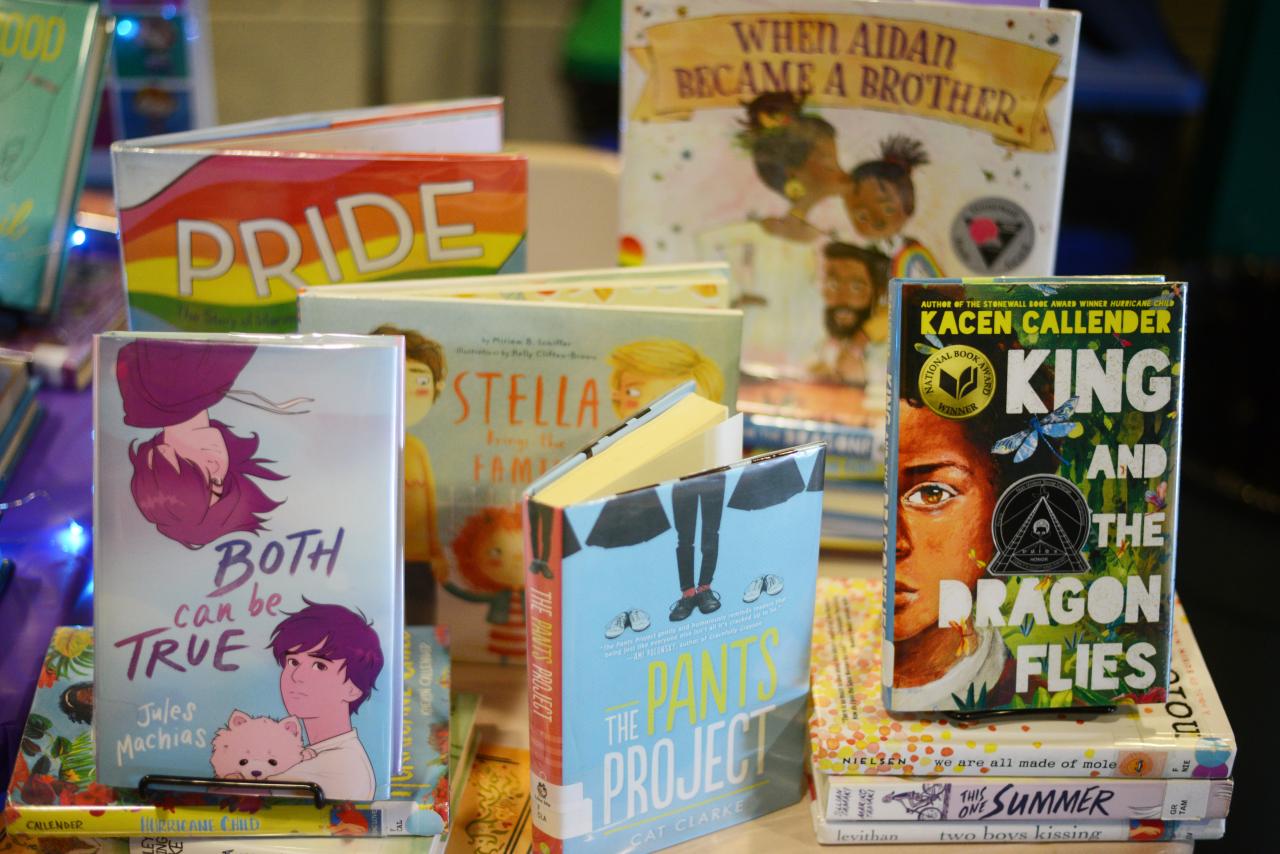The Washington Post / Getty Images
Last November, Cameron Samuels was met with cold stares when they attended a school board meeting to speak out against bans on LGBTQ books and resource websites in their district.
It was the first time Samuels attended the meeting as a student at the Katy Independent School District in Houston, Texas—but it wouldn’t be the last. Like in many districts around the country, school police officers had begun “investigating” LGBTQ books in school libraries in response to criminal complaints filed by concerned parents. But Samuels and other students in the district were starting to fight back.
Advertisement
“I was the only student in the room,” Samuels told Motherboard, recalling the board meeting. “Everyone gave me stares. Not a single person clapped. And then others came up to the lectern to speak about how we should be removing ‘gay pornography’ from the libraries and we shouldn’t be giving into these pedophiles and groomers.”
At first, Samuels felt alienated and alone. But they quickly found other students to join the cause.
“Within that next month, I started working with district officials and school board members to unblock some websites. We got nine LGBTQ and BIPOC websites unblocked by the [school’s] internet filter,” Samuels said. “And as books became a much more pressing issue in my school district, we continued to organize around that. Within the next month, I brought students together and it went from just me to maybe twenty to thirty student supporters, and then within just a couple months we packed the entire school board room with students and supporters of the LGBTQ community.”
Now Katy ISD students involved in the movement Samuels helped start are trying to push forward a book review policy, which would ensure at least one student is represented on the committee whenever a book is challenged in the district.
Katy ISD is just one of many school districts where students have begun pushing back against book bans. Recently, schools across the US have begun challenging—and in some cases successfully removing—a growing list of books from LGBTQ and Black authors. Some librarians have found themselves targeted for creating book displays featuring LGBTQ titles. And right-wing groups like Moms For Liberty have been organizing around the country to ban books they deem “obscene” from schools, and even make them illegal to sell or lend to minors.
Advertisement
Facing restrictions on what books she was able to check out at her high school library in Georgia, Alyeah McAllister is one of thousands of students who registered for a Brooklyn Public Library (BPL) ecard through its Books Unbanned initiative. The teen-led initiative from BPL aims to push back against recent attempts to remove reading materials from schools and libraries in the U.S.
“I understand that cities up north are bigger and when you have more people there will be more things available, and it was so interesting to me how many things are available through the Brooklyn Public Library website,” McAllister told Motherboard. “It just made me so happy knowing that there are some kids that could grow up with stuff like this available for them and it put me in a really really happy mood when I would scroll through.”
McAllister is starting her first year of college in New York City this fall, and while she no longer needs the out-of-state eCard, she joined Brooklyn Public Library’s Intellectual Freedom Teen Council.
Karen Keys coordinates young adult services at the Brooklyn Public Library and oversees the teen council. She says the group has been focused on gathering more information and learning more about book challenges—including why and where they happen. During the group’s July meeting, BookRiot’s editor Kelly Jensen shared a list of simple small actions that teenagers could take to challenge book bans.
Advertisement
“I think that that was really helpful for the teens to hear that it can mean a lot of little things that add up,” Keys told Motherboard. “Things as simple as checking out books or attending school board meetings, signing up to talk. Spreading information about book bans and fighting against book bans on social media, talking to your lawmakers and if you’re old enough, voting.”
Jonathan Friedman, director of free expression and education programs at PEN America says he is seeing youth voices play a critical role in book ban opposition.
“At a time when many teachers and librarians are having their speech chilled, it is often students who are leading the charge and speaking out for their rights—as they should,” Friedman told Motherboard.
McAllister acknowledges that teenagers have a lot of unrealized potential, but points out that it can be a lot of pressure to put on an adolescent to take up activism for a number of reasons. Not every student has a support system available to them to speak out against book challenges on behalf of adults.
“When you’re not 18, you occupy a unique space where in some ways you have more freedom and in some ways, you have so much less,” McAllister told Motherboard. “I understand where they’re coming from in the sense that your livelihood is not at stake. But on the other hand, if you’re not in a situation where you have a supportive family or if you have another identity marginalization it can still feel really unsafe to try to fight against certain things. There’s really only so much you can do when you’re fighting to survive.”
Related posts:
Views: 0
 RSS Feed
RSS Feed

















 September 6th, 2022
September 6th, 2022  Awake Goy
Awake Goy 
 Posted in
Posted in  Tags:
Tags: 
















